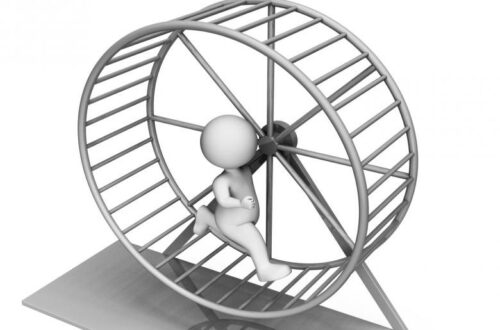
5 misunderstandings about being introverted
If someone asks you whether you are an introvert or an extrovert, do you immediately know the answer? I myself do not identify with either; I always say that I am an ambivert, somewhere between introvert and extrovert (although I am probably more introverted than extroverted). Like many people, I always thought I had a global idea of what introverted and extroverted means: introverted people are the quiet and shy types, sometimes somewhat unkindly referred to as ‘wallflowers’; extroverts are the exuberant, super-social people who get along with everyone. However, these typologies turn out to fall short.
The words ‘introvert’ and ‘extrovert’ come from Latin; introvert literally means ‘inward looking’ and extrovert means ‘outward looking’. The difference between introverts and extroverts is that introverts spend a lot of energy on what is going on in themselves, their thoughts and feelings, and extroverts mainly spend their energy on what is going on outside them. Or as Devora Zack, an expert in introversion, puts it: “Introversion is about what goes on internally, not what is observed externally.”
Being more introverted or extroverted says something about your innate disposition. The tendency you naturally have. It’s not true that society is divided into two types of people: introverts on the one hand and extroverts on the other. In reality there are no two categories of people, but a scale of which introvert and extrovert are the two extremes. Most people are not 100% introverted or extroverted, but have both introverted and extroverted characteristics. So in fact we are all ambiverts.
In addition, whether someone is more introverted or more extroverted does not depend solely on aptitude. Specific circumstances can also influence the degree to which someone behaves more introverted or extroverted. Think for example of your social environment; the people you associate with, your family, your work. The company you are in at any given time affects how you behave. Fatigue can also contribute to someone being (temporarily) more introverted. People also seem to become more introverted as they age.
So labelling people as ‘an introvert’ or ‘an extrovert’ often does not do justice to their personality or their behavior in a certain situation. Rather, it is a matter of degree: more or less introverted and more or less extroverted. Nevertheless, there are all sorts of self-tests on the internet that divide you into one of the two categories and many articles on the subject talk about the properties of ‘the introvert’ and ‘the extrovert’. And so a lot of misunderstandings maintain, especially about the more introverted people among us. Below I will try to clarify five of them.
1. Introverts are shy.
It is a common misconception that introverted people are shy and do not like human contact. In reality, there is no connection between introversion and shyness. There is, however, a difference in the way in which more introverted and more extroverted people communicate. Introverted people tend to think and shape their thoughts first and then speak, while more extroverted people shape their thoughts while they speak. As a result, extroverted people often appear very open.
Also, introverted people are more than extroverted people busy with their own thoughts and feelings – something that is not visible to others. And that has consequences for the way they connect. Introverted people have to put a little more effort into this; they have to turn their focus outward, while this is already the case with more extroverted people. As a result, social activities takes more energy from introverted people. So yes, more introverted people are a bit calmer and quieter, but that doesn’t mean they are shy.
2. Introverts are insecure.
Because introverted people are more concerned with what is going on in themselves compared to extroverted people, they can seem cautious and conservative. But cautious and conservative is not the same as insecure! Being introverted has nothing to do with being insecure. There are confident introverts and insecure extroverts.
The difference – and the cause of the misunderstanding – lies in the way in which more introverted and more extroverted people initially react. Extroverted people usually do not need much time to say ‘yes’ to something and therefore appear to be spontaneous. They are action and result oriented, and have less aptitude – and patience – to reflect quietly first. However, on the downside, this can cause them to act thoughtlessly; they jump in, as it were, without having thought about it.
Introverted people are usually a bit more cautious than extroverted people. They prefer to think things through, are more likely to doubt, and weigh pros and cons, and then make an informed decision. I personally think that is a quality. But that is why more introverted people often need a little more time to say ‘yes’ and may appear less spontaneous in the sense that they don’t respond positively within a second. But again, that’s not insecure, I would rather call it deliberative.
Wherever you are on the scale between introvert and extrovert, that doesn’t make you better or less than anyone else!
Partly because extroverted people quickly say ‘yes’, being extroverted is often associated with action and adventure. Does that mean that introverts are passive and boring? No, that certainly does not have to be true. More introverted people are generally calmer, but they can be just as active and adventurous as more extroverted people. And they are equally open to great ideas and ambitious plans. They just need a little time to think about it.
3. Introverts are closed and boring.
Because introverted people are often quieter and stay a bit more in the background, you can get the impression that they are not so accessible. More extroverted people, on the other hand, often appear open and accessible. However, that shouldn’t stop you from making contact with more introverted people. People who are introverted can also be very open and talkative, but you may have to put in a little more effort to make contact.
Extroverted people are ‘talkers’; they talk about everything and they talk a lot. People who are more introverted are not so much more closed, but more selective and dosed. And introverted people are generally less good at ‘small talk’; they prefer to enter into more in-depth and lasting contacts. The fact that introverted people are more concerned with what is going on within them does not mean that they are just focused on themselves, on the contrary: they are usually very good at observing and listening. Maybe introverted people are not everyone’s friends, but they are often good company.
Introverted people are generally more cautious about drawing quick conclusions and have more eye for nuance than more extroverted people, who tend to draw conclusions faster and think more ‘black and white’. Extroverted people not only have an opinion more quickly, but they also change it more easily. They are more sensitive to external influences and approval from other people. People who are more introverted may need a little more time to form their opinion, but they then have a good story and stick to it. In that sense, you could say that introverted people are somewhat more solid and extraverted people can be a bit more unpredictable.
4. Introverts are not social.
People who are extroverted make contact with others easily and therefore appear social. Introverts don’t necessarily have to interact with everyone all the time. Does that make them less social? That is mainly a matter of how you measure ‘being social’. In any case, social contact is a human need that is not reserved for extroverted people.
Introverted people really don’t sit alone at home all the time, they can be just as ‘outgoing’ as more extroverted people. However, as mentioned, social activities take more energy from introverted people. That is why they need more time for themselves to ‘recharge’. So the idea that introverts prefer to spend the evening at home is partially true, but that has nothing to do with ‘not being social’.
People who are extroverted get energy from contact with others. But this also has a downside: Because extroverted people are more outwardly focused, on the interaction with other people, they are also more dependent on others. Not surprisingly, more extroverts generally find it more difficult to be alone than more introverts. Introverts are, as it were, more ‘self-sufficient’. On the other hand, extroverted people can easily talk to everyone and they are good at ‘small talk’. Partly because of this, they make contact easily and are generally better at networking (an important condition for social ‘success’.) Although in practice this often leads to more contacts, these are also more volatile and temporary contacts.
5. Being extroverted is ‘better’ than being introverted.
Our society seems to have more eye for the – visible – qualities that characterize extroverted people: spontaneity, sociability, enthusiasm, focus on action and results. Those who know best to ‘sell’ themselves achieve the most. And extroverted people are generally better at that. People who play a leading role, in politics, in a company or in a social group, are often extroverted people.
Because extroverted characteristics play such an important role in society, less attention is paid to the – less visible – characteristics of introverted people: tranquility, caution, deliberate approach, reflection, depth. This can cause introverts to feel uncomfortable and even try their best to behave more extrovert, against their predispositions, thinking that that is ‘socially desirable’ and more successful.
Let me therefore conclude by emphasizing that the qualities of introverted people – as hopefully has already been clear from the above – are just as valuable. Both personality types have advantages and disadvantages, and wherever you are on the scale between introvert and extrovert, that doesn’t make you better or less than anyone else!




